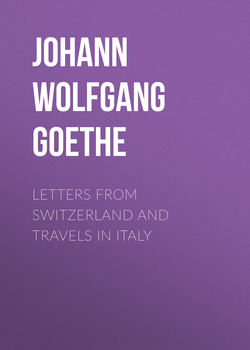Читать книгу Letters from Switzerland and Travels in Italy - Johann Wolfgang von Goethe - Страница 25
LETTERS FROM SWITZERLAND
PART THE SECOND
Brieg
ОглавлениеTowards evening the sky was uncommonly beautiful. As we arrived at Brieg, the clouds got there almost as soon as we did; however, as the sun had set, and a driving east wind blew against them, they were obliged to come to a halt, and formed a huge crescent from mountain to mountain across the valley. The cold air had greatly condensed them, and where their edge stood out against the blue sky, it presented to the eye many beautiful, light, and elegant forms. It was quite clear that they were heavy with snow; however, the fresh air seemed to us to promise that much would not fall during the night.
Here we are in a very comfortable inn, and what greatly tends to make us contented, we have found a roomy chamber with a stove in it, so that we can sit by the fire-side and take counsel together as to our future travels. Through Brieg runs the usual road to Italy over the Simplon; should we, therefore, give up our plan of going over the Furca to Mont S. Gothard, we shall go with hired horses and mules to Domo d'Ossula, Margozro, pass up Lago Maggiore, and then to Bellinzona, and then on to S. Gotthard, and over Airolo to the monastery of the Capuchins. This road is passable all the winter through, and is good travelling for horses; however, to our minds it is not very inviting, especially as it was not in our original plan, and will not bring us to Lucerne till five days after our friend. We wish rather to see the whole of the Valais up to its extreme limit, whither we hope to come by to-morrow evening, and, if fortune favours, we shall be sitting by about the same time next day in Realp, in the canton of Uri, which is on Mont Gotthard, and very near to its highest summit. If we then find it impossible to cross the Furca, the road back to this spot will still be open to us, and then we can take of necessity the route which of free choice we are disinclined to.
You can well believe that I have here closely examined the people, whether they believe that the passage over the Furca is open, for that is the one idea with which I rise up, and lie down to sleep, and occupy myself all day long. Hitherto our route may be compared to a march to meet an enemy, and now it is as if we were approaching to the spot where he has entrenched himself, and we must give him battle. Besides our mule two horses are ordered to be ready by the evening.
Munster, Nov. 11, 1779.
Evening, 6 o'clock.
Again we have had a pleasant and prosperous day. This morning as we set out early and in good time from Brieg our host, when we were already on the road said, "If the mountain (so they call the Furca here,) should prove too fearful, you can easily come back and take another route." With our two horses and mule we soon came upon some pleasant meadows, where the valley becomes so narrow that it is scarcely some gun-shots wide. Here are some beautiful pasture lands, on which stand large trees, while pieces of rock lie scattered about which have rolled down from the neighbouring mountains. The valley gradually grows narrower, and the traveller is forced to ascend along the side of the mountain, having the while the Rhone below him in a rugged ravine on his left. Above him, however, the land is beautifully spread out; on the variously undulating hills are verdant and rich meadows and pretty hamlets, which, with their dark-brown wooden houses, peep out prettily from among the snow. We travelled a good deal on foot, and we did so in turns to accommodate one another. For although riding is safe enough, still it excites one's alarm to see another riding before you along so narrow a track, and on so weak an animal, and just on the brink of so rugged a precipice; and as too there are no cattle to be seen on the meadows, (for the people here shut them all up in sheds at this season,) such a region looks lonely, and the thought that one is continually being hemmed in closer and closer by the vast mountains, fills the imagination with sombre and disagreeable fancies, enough to make you fall from your seat, if you are not very firm in the saddle. Man is never perfectly master of himself. As he lives in utter ignorance of the future, as indeed what the next moment may bring forth is hidden from him, consequently, when anything unusual falls beneath his notice, he has often to contend with involuntary sensations, forebodings, and dream-like fancies, at which shortly afterwards he may laugh outright, but which at the decisive moment are often extremely oppressive.
